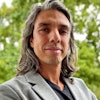United Tribes Technical College Left Out of Indian Affairs Budget Request for Fifth Straight Year
Legislators say funding cut sends wrong message to American Indian community
By David Pluviose
For the fifth consecutive fiscal year, the Bush administration has zeroed out funding for the United Tribes Technical College. In the previous four years, Congress restored funding for the Bismarck, N.D., intertribal college in the Department of the Interior budget, appropriating $3.5 million in fiscal year 2006. Sen. Byron Dorgan, D-N.D., says the cuts are “flat wrong” and he will once again work to restore UTTC’s federal funding.
“This is one of the top tribal colleges in the country. To continually offer zero funding for this school is to fail to recognize the important role UTTC plays, so I will fight to restore funding for the school again,” says Dorgan, who is vice chairman of the Senate Committee on Indian Affairs and the ranking member of the Senate Interior Appropriations Committee.
Founded in 1969, UTTC is operated by five American Indian tribes. All five, the MHA Nation (consisting of the Mandan, Hidatsa and Arikara tribes), the Spirit Lake, the Sisseton Wahpeton Sioux, the Standing Rock Sioux and the Turtle Mountain Band of Chippewa, are either fully or partially based in North Dakota. UTTC officials have said in the past that cutting federal support — about half of its operating funds — would force the college to close. Jesi Shanley, UTTC’s associate dean of student and campus services, says losing federal support now would lead to massive staff and program cuts.
“When I first started here in 2002, we had just barely over 500 students. This year we have 1,113 students. That’s 1,113 students that would not be reached any place else,” Shanley says.
John Gritts, the American Indian College Fund’s tribal college liaison, says cutting UTTC’s federal funding “just baffles me,” as the college has played a key role in equipping members of numerous tribes with the skills necessary to become self-sufficient.
“[Federal funding] is the heartbeat of the institution,” Gritts says. “All the colleges are underfunded miracles, and United Tribes is in the same position. They need the core funding in order to provide services to the communities. You take away the core funding, there’s just no backbone.”
And serving UTTC’s burgeoning student population, up 20 percent since last year, would be nearly impossible without federal funding, as the college’s staff is already working double-time, Shanley adds.
National Indian Education Association President Ryan Wilson suspects that politics is behind the zeroing out of UTTC’s funds year after year, causing North Dakota’s all-Democrat Congressional delegation to work overtime to get the funds restored in the final version of the federal budget.
“The president should make a fundamental commitment to [United Tribes Technical College]. I think there’s a sense it gets zeroed out every year almost in retaliation, I believe, for the Congressional delegation from North Dakota opposing the president on some things,” Wilson says.
Wilson also voices his concern that tribal colleges receive less attention than other minority-serving institutions when it comes to federal budgeting.
“Why would you not fund tribal colleges at the same level as you fund historically Black colleges? It makes no sense and it shows where [Bush’s] priorities really are,” he says.
Joe Herrin, finance systems specialist with the Bureau of Indian Affairs, argues that UTTC is not the victim of political retaliation. He says funding for UTTC is left out of the BIA budget request because of Office of Management and Budget mandates.
“Because of the constraints posed on our budget by OMB, the Congressional add-ons are not included in future requests, and that particular school has been an add-on for the past five years or so,” Herrin says.
Nevertheless, Arizona Republican Sen. John McCain, who chairs the Committee on Indian Affairs, expressed his dissatisfaction with the budgets handed down by the Bush administration during a Feb. 14 Indian Affairs oversight hearing.
“I think my friend Sen. Dorgan would agree with me that sometimes we see these budgets come over with cuts that are going to be restored by Congress. It’s a game as old as there is … as long as we have been doing business. But I think some of these cuts send out the wrong signal to Indian country as to what our belief on our fulfillment of our obligation to Native Americans is all about,” McCain said.
“I think sometimes we have recommendations to zero out funding with the full expectation that Congress would not allow that with certain programs,” Dorgan adds.
Herrin says funding for tribal schools is a more pressing priority for the Bush administration than funding tribal colleges.
“The priority is the elementary and secondary [schools]; we fund those 184 schools. The No. 1 priority is to maintain those 184 schools, then we move into postsecondary,” he says.
That puts UTTC’s leaders, as well as most other tribal college leaders, in a tough spot. Instead of strengthening their programs, UTTC’s administrators must devote their attention to keeping the college’s core funding stable, Shanley says.
“Right now, we have two of our deans, along with our president, in Washington, D.C., fighting for the restoration of our funding, when we could be, as a campus, growing and moving forward. All of us, staff and students, have to be worried about the budget. What does that do to recruitment? What does it do to staff morale?” she says.
“We could be concentrating on bigger, better [projects] that move us forward as an institution, but instead we’re just trying to hang on and get our funding restored,” Shanley adds.
© Copyright 2005 by DiverseEducation.com





















